Consortium Launches eLearning Course on Non-proliferation, Disarmament and EU Policies
The eLearning course “EU Non-proliferation and Disarmament” covers all relevant aspects of the EU non-proliferation and disarmament agenda. It aims to provide a comprehensive knowledge resource for practitioners and scholars […]
Find out more »The eLearning course “EU Non-proliferation and Disarmament” covers all relevant aspects of the EU non-proliferation and disarmament agenda.
It aims to provide a comprehensive knowledge resource for practitioners and scholars interested in arms control, non-proliferation and disarmament, and EU policies in these fields. The course was designed, developed and launched by the EU Non-Proliferation Consortium and funded through the EU Council Decision CD 2014/129/CFSP of 10 March 2014. The course consists of 15 Learning Units covering both non-conventional and conventional weapons, and has an optional certificate section. 24 authors from 12 European countries and the EU contributed to the course, which represents an open educational resource for all interested users world-wide.

EU Non-Proliferation and disarmament Internships
The EU Non-Proliferation Consortium will support 30 Non-Proliferation and Disarmament Internships in European think tanks between 2022 and 2025 (see COUNCIL DECISION (CFSP) 2022/597 of 11. April 2022). The duration […]
Find out more »The EU Non-Proliferation Consortium will support 30 Non-Proliferation and Disarmament Internships in European think tanks between 2022 and 2025 (see COUNCIL DECISION (CFSP) 2022/597 of 11. April 2022).
The duration of each internship shall be 3 month (13 weeks). All members of the European network of independent non-proliferation think-tanks are eligible as host institutes for an EU Non-Proliferation and Disarmament internship. For each internship the host institute will be granted 3,000 €. The EU Non-Proliferation Consortium can provide limited subsidies (950 € / month) for a limited number of students (min. requirement: BA) for the duration of the internship. Host institutes for an EU Non-Proliferation and Disarmament Internship must meet the following requirements:- Membership in the European network of independent non-proliferation think-tanks
- Availability of office space / working place for intern
- At least one expert specialized in non-proliferation or disarmament affairs and corresponding EU policies
- At least one expert must have teaching / tutoring experience and serve as the general supervisor
Next Generation papers
 The participation of the EU in the negotiation and implementation of the Iran nuclear agreement, András Windt, October 2017
Europe and Nuclear Disarmament: Controversial Views, Ekaterina Shirobokova, August 2017
ARCHIVES
The participation of the EU in the negotiation and implementation of the Iran nuclear agreement, András Windt, October 2017
Europe and Nuclear Disarmament: Controversial Views, Ekaterina Shirobokova, August 2017
ARCHIVES
The UN Disarmament Fellows’ Visit to Brussels
From 13 to 15 September 2023, the Vienna Center for Disarmament and Non-Proliferation (VCDNP), on behalf of the EU Non-Proliferation and Disarmament Consortium (EUNPDC), organised a visit to the seat […]
Find out more »
UN Fellows and VCDNP staff at the European External Action Service with Marjolijn van Deelen (in green)
The visit of the UN Disarmament Fellows to Brussels, which has taken place every year since 2018, is aimed at introducing participants to the EU’s decision-making processes and policies on disarmament and non-proliferation. This year, the programme started with a visit to the European External Action Service (EEAS), where the Fellows were welcomed by Amb. Marjolijn van Deelen, EU Special Envoy for Non-Proliferation and Disarmament. At the EEAS, the Fellows gained insights into the EU's extensive involvement in international security, non-proliferation, and disarmament matters, including countering the spread of weapons of mass destruction, coordinating arms and dual-use export controls, and formulating policies on outer space. Presentations were delivered by EEAS and European Commission experts from different offices.
At the EEAS, the Fellows gained insights into the EU's extensive involvement in international security, non-proliferation, and disarmament matters, including countering the spread of weapons of mass destruction, coordinating arms and dual-use export controls, and formulating policies on outer space. Presentations were delivered by EEAS and European Commission experts from different offices.

Jose Torres, Policy Officer in the Directorate General for Trade of the European Commission delivering a presentation
Following briefings at the EEAS, fellows were offered a guided tour of the Council premises where a wide array of significant events, including EU summits, multilateral summits, and ministerial meetings are held. The second day of the visit was dedicated to thematic presentations from experts at the Belgian Ministry of Foreign Affairs, the NATO, and the EUNPDC Network. Eirini Lemos-Maniati, Deputy Director of the Arms Control, Disarmament, and WMD Non-Proliferation Centre, briefed the Fellows on NATO’s work in the field; Sigurd Schelstraete, Director of Disarmament and Non-Proliferation at the Belgian Ministry of Foreign Affairs, offered a national perspective; and Dr. Sybille Bauer, Chair of the EUNPD Consortium, provided an overview of the Consortium’s history, structure, goals, and activities. Raluca Csernatoni, Louis Reitmann, and Clémence Poirier, respectively researchers at Carnegie Europe, the VCDNP, and the European Space Policy Institute (ESPI) and members of the EUNPDC Network, provided insights on artificial intelligence, the value of diversity for nuclear weapons policy, as well as ballistic missile proliferation and cybersecurity.
Raluca Csernatoni, Louis Reitmann, and Clémence Poirier, respectively researchers at Carnegie Europe, the VCDNP, and the European Space Policy Institute (ESPI) and members of the EUNPDC Network, provided insights on artificial intelligence, the value of diversity for nuclear weapons policy, as well as ballistic missile proliferation and cybersecurity.
 Fellows were then offered tours of the Parlamentarium and the House of European History, where they learned about the complexity and the decades-long processes that led to the creation of the European Union as well as the structure and functions of the EU policy-making bodies.
Fellows were then offered tours of the Parlamentarium and the House of European History, where they learned about the complexity and the decades-long processes that led to the creation of the European Union as well as the structure and functions of the EU policy-making bodies.

UN Fellows and VCDNP staff at the European Council
The VCDNP would like to extend its gratitude to the EEAS and the EU Council for their generous support and cooperation in organizing this visit.Short Course on The Spread of Nuclear Weapons: History, Threats and Solutions
On 19-21 February 2020, the VCDNP held the first course on nuclear non-proliferation for graduate and post-graduate students in the fields of IT and engineering, titled “The Spread of Nuclear […]
Find out more » Course instructors Alexi Drew (King’s College London), Gaukhar Mukhatzhanova (VCDNP), Sibylle Bauer (SIPRI), Elena Sokova (VCDNP) and Jean-Maurice Crete (IAEA, retired) during the course’s final session on “Nuclear Proliferation, New Technologies, and the Shape of the Future[/caption]
The three-day course was designed to provide an introduction to nuclear non-proliferation and disarmament issues to students of technical subjects. The program covered a broad range of topics, from the fundamentals of the nuclear fuel cycle and the history of the spread of nuclear weapons, to export controls and the challenges and opportunities presented by advanced and emerging technologies.
The students learned about different elements of the international non-proliferation regime, including the Treaty on the Non-Proliferation of Nuclear Weapons, the International Atomic Energy Agency (IAEA) and its safeguards, and the Comprehensive Nuclear-Test-Ban Treaty Organization (CTBTO) and the verification system it establishes. Course participants also received an overview of how open source information and tools, including satellite imagery and image analysis software, can be used to monitor nuclear and missile programs such as that of North Korea.
The lecturers at the course included experts from the VCDNP, the James Martin Center for Nonproliferation Studies, IAEA, CTBTO, Stockholm International Peace Research Institute, King’s College London and Austrian Red Cross.
[caption id="attachment_10382" align="aligncenter" width="619"]
Course instructors Alexi Drew (King’s College London), Gaukhar Mukhatzhanova (VCDNP), Sibylle Bauer (SIPRI), Elena Sokova (VCDNP) and Jean-Maurice Crete (IAEA, retired) during the course’s final session on “Nuclear Proliferation, New Technologies, and the Shape of the Future[/caption]
The three-day course was designed to provide an introduction to nuclear non-proliferation and disarmament issues to students of technical subjects. The program covered a broad range of topics, from the fundamentals of the nuclear fuel cycle and the history of the spread of nuclear weapons, to export controls and the challenges and opportunities presented by advanced and emerging technologies.
The students learned about different elements of the international non-proliferation regime, including the Treaty on the Non-Proliferation of Nuclear Weapons, the International Atomic Energy Agency (IAEA) and its safeguards, and the Comprehensive Nuclear-Test-Ban Treaty Organization (CTBTO) and the verification system it establishes. Course participants also received an overview of how open source information and tools, including satellite imagery and image analysis software, can be used to monitor nuclear and missile programs such as that of North Korea.
The lecturers at the course included experts from the VCDNP, the James Martin Center for Nonproliferation Studies, IAEA, CTBTO, Stockholm International Peace Research Institute, King’s College London and Austrian Red Cross.
[caption id="attachment_10382" align="aligncenter" width="619"] Course instructors Alexi Drew (King’s College London), Gaukhar Mukhatzhanova (VCDNP), Sibylle Bauer (SIPRI), Elena Sokova (VCDNP) and Jean-Maurice Crete (IAEA, retired) during the course’s final session on “Nuclear Proliferation, New Technologies, and the Shape of the Future[/caption]
Course instructors Alexi Drew (King’s College London), Gaukhar Mukhatzhanova (VCDNP), Sibylle Bauer (SIPRI), Elena Sokova (VCDNP) and Jean-Maurice Crete (IAEA, retired) during the course’s final session on “Nuclear Proliferation, New Technologies, and the Shape of the Future[/caption]Non-Proliferation, Arms Control and Disarmament: Changes in the Field and Career Tracks
The Initiative encourages young women and the next generation to enter the non‑proliferation, arms control, and disarmament field, especially at a time in which the global pandemic has isolated many young people who may find themselves lacking resources and assistance.
Find out more »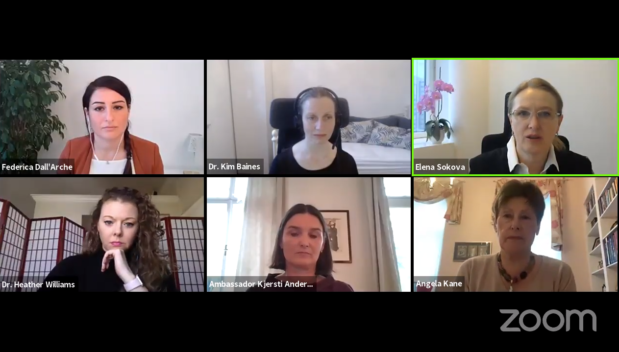
February 2021 Introductory Course on the Proliferation of Weapons of Mass Destruction
From 22 to 26 February 2021, the VCDNP held its first intensive introductory course on the proliferation of weapons of mass destruction (WMD) for students of biological and chemical sciences. […]
Find out more »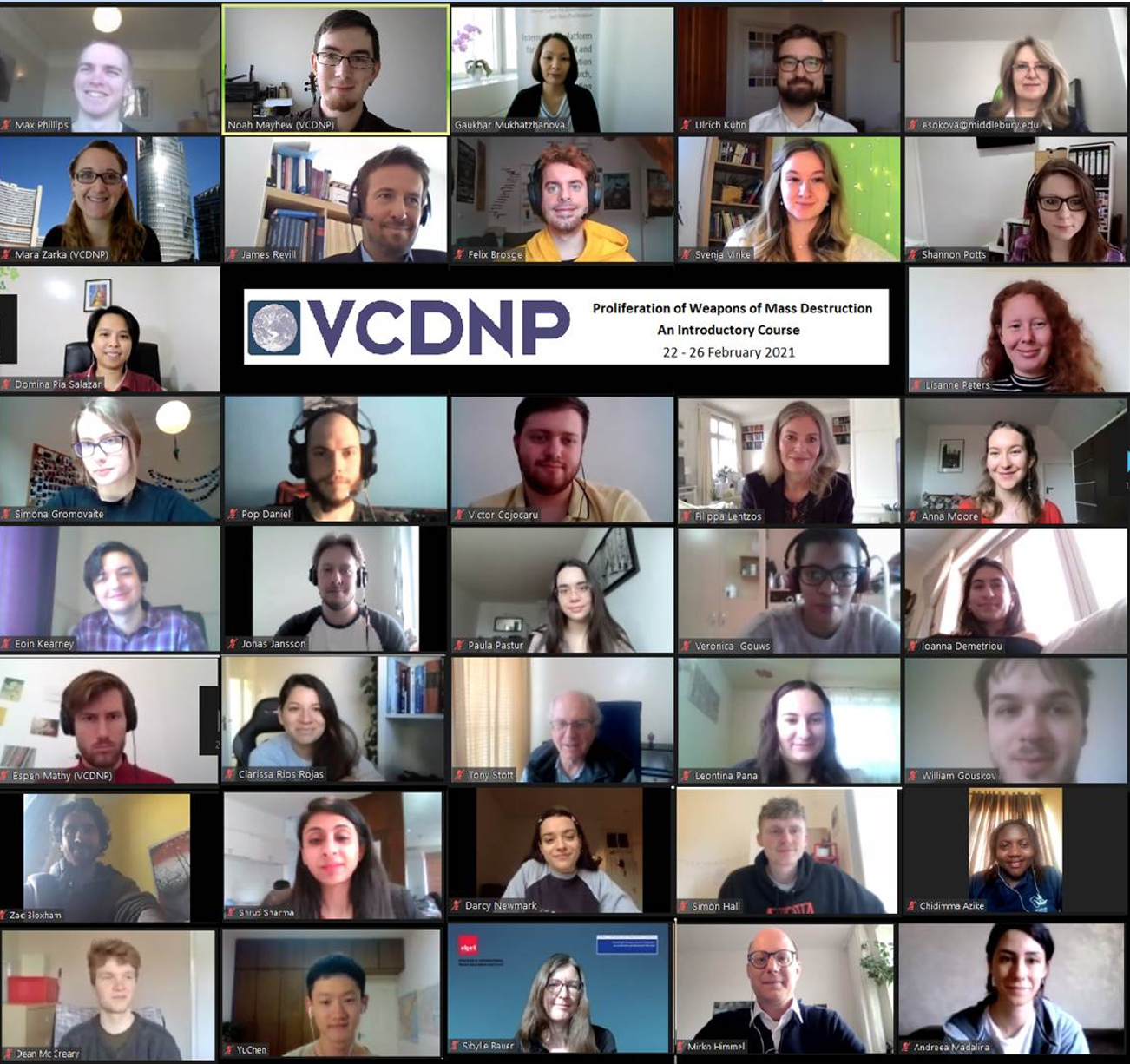 The course covered a broad range of topics and was designed to provide an overview of the basics of biological, chemical and nuclear weapons and their proliferation, existing control regimes, and potential impact of new and emerging technologies on WMD threats.
Students learned about various elements of the international WMD disarmament and non-proliferation regimes, including the Biological and Toxin Weapons Convention (BWC), the Chemical Weapons Convention (CWC), and the Treaty on the Non-Proliferation of Nuclear Weapons (NPT), as well as strategic trade controls. Course sessions also provided an in-depth look at the advances in life sciences and their implications for chemical and biological weapon threats. The programme included case studies on biosecurity and ethics, nuclear proliferation challenges, and investigation of chemical weapons use and dismantlement of a chemical weapons arsenal.
[caption id="attachment_10536" align="aligncenter" width="468"]
The course covered a broad range of topics and was designed to provide an overview of the basics of biological, chemical and nuclear weapons and their proliferation, existing control regimes, and potential impact of new and emerging technologies on WMD threats.
Students learned about various elements of the international WMD disarmament and non-proliferation regimes, including the Biological and Toxin Weapons Convention (BWC), the Chemical Weapons Convention (CWC), and the Treaty on the Non-Proliferation of Nuclear Weapons (NPT), as well as strategic trade controls. Course sessions also provided an in-depth look at the advances in life sciences and their implications for chemical and biological weapon threats. The programme included case studies on biosecurity and ethics, nuclear proliferation challenges, and investigation of chemical weapons use and dismantlement of a chemical weapons arsenal.
[caption id="attachment_10536" align="aligncenter" width="468"]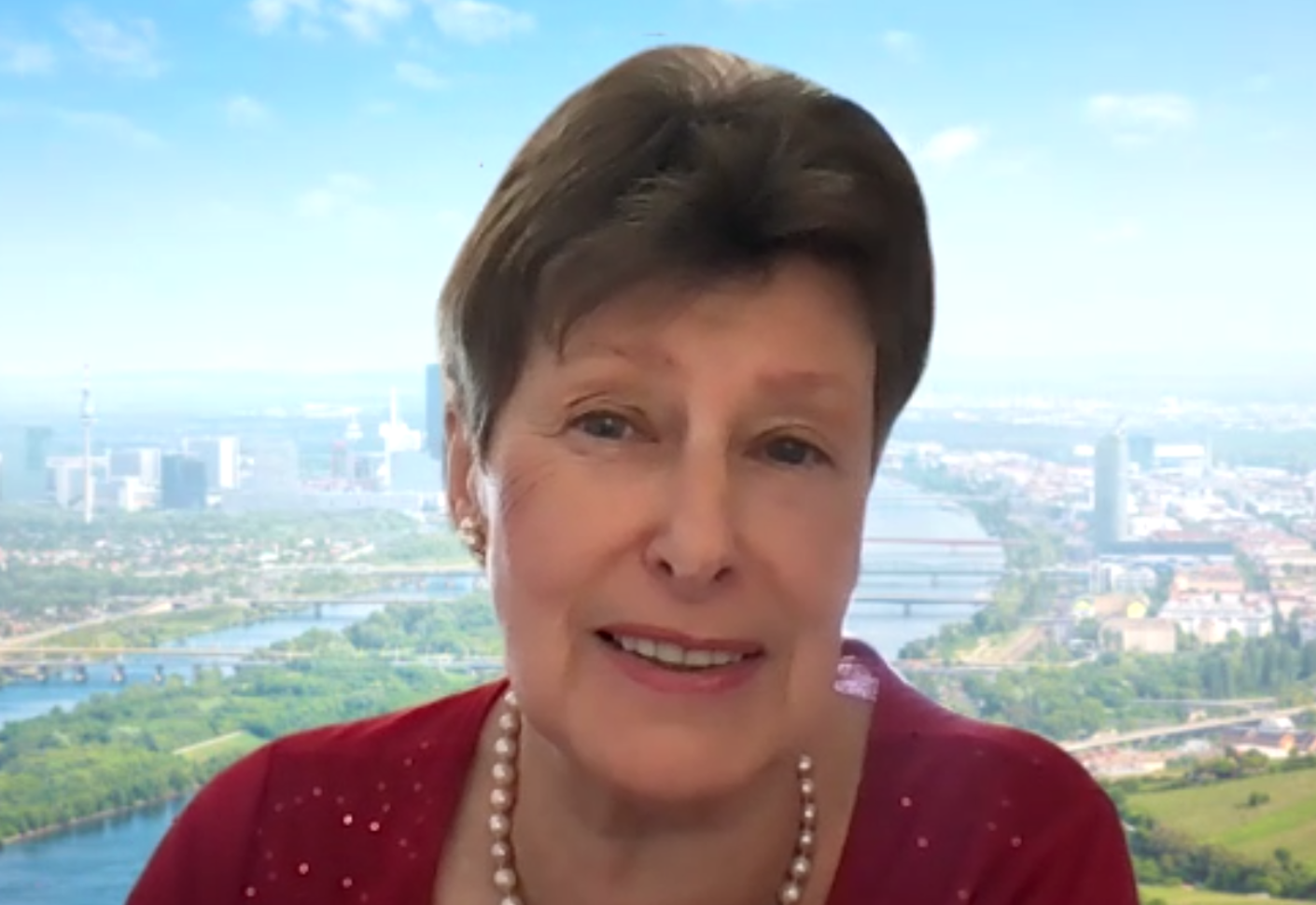 VCDNP Senior Fellow Angela Kane participating in the session dedicated to a case study on Syria’s chemical weapons program.[/caption]
A panel discussion on new and emerging technologies featuring Dr. Filippa Lentzos (King’s College London), Dr. Ulrich Kühn (IFSH), and Dr. James Revill (UNIDIR) allowed for a candid exchange of opinions concerning the threats and opportunities these technologies present for mitigating WMD risks.
[caption id="attachment_10537" align="aligncenter" width="1530"]
VCDNP Senior Fellow Angela Kane participating in the session dedicated to a case study on Syria’s chemical weapons program.[/caption]
A panel discussion on new and emerging technologies featuring Dr. Filippa Lentzos (King’s College London), Dr. Ulrich Kühn (IFSH), and Dr. James Revill (UNIDIR) allowed for a candid exchange of opinions concerning the threats and opportunities these technologies present for mitigating WMD risks.
[caption id="attachment_10537" align="aligncenter" width="1530"] Filippa Lentzos (King’s College London), Ulrich Kühn (IFSH), and Dr. James Revill (UNIDIR) discussion new and emerging technologies and WMD threats.[/caption]
Experts and senior officials from international organisations and academic institutions that presented at the course included Dr. Sibylle Bauer (SIPRI), Daniel Feakes (BWC Implementation Support Unit), Dr. Mirko Himmel (University of Hamburg), Dr. Peter Hotchkiss (OPCW), Dr. Ulrich Kühn (IFSH), Dr. Filippa Lentzos (King’s College London), Dr. James Revill (UNIDIR), Dr. Clarissa Rios Rojas (Cambridge University), Shruti Sharma (Carnegie Endowment for International Peace, India), and Jerry Smith (CHC Global, former OPCW Team Leader). The VCDNP lecturers included Angela Kane, Gaukhar Mukhatzhanova, and Elena Sokova. Women made up 54 percent of the lecturers.
[caption id="attachment_10538" align="aligncenter" width="624"]
Filippa Lentzos (King’s College London), Ulrich Kühn (IFSH), and Dr. James Revill (UNIDIR) discussion new and emerging technologies and WMD threats.[/caption]
Experts and senior officials from international organisations and academic institutions that presented at the course included Dr. Sibylle Bauer (SIPRI), Daniel Feakes (BWC Implementation Support Unit), Dr. Mirko Himmel (University of Hamburg), Dr. Peter Hotchkiss (OPCW), Dr. Ulrich Kühn (IFSH), Dr. Filippa Lentzos (King’s College London), Dr. James Revill (UNIDIR), Dr. Clarissa Rios Rojas (Cambridge University), Shruti Sharma (Carnegie Endowment for International Peace, India), and Jerry Smith (CHC Global, former OPCW Team Leader). The VCDNP lecturers included Angela Kane, Gaukhar Mukhatzhanova, and Elena Sokova. Women made up 54 percent of the lecturers.
[caption id="attachment_10538" align="aligncenter" width="624"] Dr. Sibylle Bauer and Dr. Mirko Himmel give an overview of Strategic Trade Controls.[/caption]
[embeddoc url="http://frs.agni.fr/wp-content/uploads/2021/04/2021-Feb-Intro-to-WMD-Course-Programme.pdf" download="all" viewer="google"]
At the end of the course, the participants completed a questionnaire, which gave them an opportunity to assess various aspects of the short course and anonymously provide feedback. Overall, the participants rated the course as an excellent contribution to their knowledge and understanding of issues related to WMD proliferation risks. Below are some of the comments provided by participants (quoted as written):
It introduced me to the world of non-proliferation and how important it is for our world. It also helped me understand all the mechanism[s] that are necessary to implement the controls and the tough job behind all of this.
***
As an undergraduate student, it is very rare that we are taught about the ethical side of what we are doing. Recently there have been some improvements in teaching about sustainability concerns, but this course has been basically the only formal education on security threats that our research may pose. I would say that I have learned a lot on the matter, and that I now have a base and some pointers to continue my education in this topic.
***
This course offered me a complete picture of all weapons of mass destruction but also of possible future risks. Amazing speakers and wonderful presentation of all key points.
***
Thank you for having this course for students with science background. This course will greatly help us understand that there is more that science can offer in terms of international peace, security and stability.
The VCDNP extends its gratitude to the EU Non-Proliferation and Disarmament Consortium for their generous support that made this course possible. The course was funded by the European Union through the EUNPDC pursuant to the EU Council Decision 2018/299.
Dr. Sibylle Bauer and Dr. Mirko Himmel give an overview of Strategic Trade Controls.[/caption]
[embeddoc url="http://frs.agni.fr/wp-content/uploads/2021/04/2021-Feb-Intro-to-WMD-Course-Programme.pdf" download="all" viewer="google"]
At the end of the course, the participants completed a questionnaire, which gave them an opportunity to assess various aspects of the short course and anonymously provide feedback. Overall, the participants rated the course as an excellent contribution to their knowledge and understanding of issues related to WMD proliferation risks. Below are some of the comments provided by participants (quoted as written):
It introduced me to the world of non-proliferation and how important it is for our world. It also helped me understand all the mechanism[s] that are necessary to implement the controls and the tough job behind all of this.
***
As an undergraduate student, it is very rare that we are taught about the ethical side of what we are doing. Recently there have been some improvements in teaching about sustainability concerns, but this course has been basically the only formal education on security threats that our research may pose. I would say that I have learned a lot on the matter, and that I now have a base and some pointers to continue my education in this topic.
***
This course offered me a complete picture of all weapons of mass destruction but also of possible future risks. Amazing speakers and wonderful presentation of all key points.
***
Thank you for having this course for students with science background. This course will greatly help us understand that there is more that science can offer in terms of international peace, security and stability.
The VCDNP extends its gratitude to the EU Non-Proliferation and Disarmament Consortium for their generous support that made this course possible. The course was funded by the European Union through the EUNPDC pursuant to the EU Council Decision 2018/299.Young Women in Non-Proliferation and Disarmament Mentorship Programme Launch Event
Young Women in Non-Proliferation and Disarmament Mentorship Programme Launch Event On 12 April 2021, the International Affairs Institute (IAI) and the Vienna Center for Disarmament and Non-Proliferation (VCDNP), as part […]
Find out more »Young Women in Non-Proliferation and Disarmament Mentorship Programme Launch Event
On 12 April 2021, the International Affairs Institute (IAI) and the Vienna Center for Disarmament and Non-Proliferation (VCDNP), as part of the Young Women and Next Generation Initiative (YWNGI), held the first meeting of the recently established Young Women in Non-Proliferation and Disarmament (YWNPD) Mentorship Programme. The YWNPD mentorship programme, which is organized in the framework of the EU Non-Proliferation and Disarmament Consortium (EUNPDC), pairs 19 young women (mentees), carefully chosen through a highly-competitive selection process, with well-established experts (mentors) to engage in a mentoring relationship that envisions, among other things, regular video-conferencing sessions. Mentees are also expected to attend conferences, seminars, social events, and other activities to be exposed to networking and career opportunities.
EU Non-Proliferation and Disarmament Next Generation Follow-Up Meeting
Due to the current COVID-19 pandemic, there are currently few opportunities for the next generation to meet around the world and think together about the great challenges of our times. […]
Find out more »VIEW THE MEETING AGENDA
The Impact of COVID-19 and other Bio-Security Challenges
The first topic was addressed by Dr. Filippa Lentzos, Senior Research Fellow at the King’s College London. As pointed by Federica Dall’Arche, Researcher at IAI and moderator of the panel, the topic was particularly timely due to recent discussions on the origin of the virus. In order to reach an assessment of the health and societal impacts caused by COVID-19, Dr. Lentzos walked the participants through an accurate and anguished timeline of the pandemic stressing, in particular, the evolution of the Chinese government’s narrative on the spread of the virus, the role of the World Health Organization and the progressive recognition of the modalities of human-to-human transmission. As the pandemic escalated, however, many questions remain unanswered, according to Dr. Lentzos. The direct impact of the virus on health is still poorly understood and the extent of the indirect and long-term consequences will only fully emerge with time. The enormous socioeconomic effects of the virus, however, are already clear. Dr. Lentzos noted how the virus led to the disappearance of 225 million full-time jobs around the world and has exacerbated long-standing economic, racial and gender divides. Women, in particular, are paying the highest price, comprising 70% of global health and social care personnel. In addition to the consequently increased exposure to risk, women are also victims of what UN Women has called “the shadow pandemic,” i.e. a worrying increase in gender-based violence and domestic violence.
Cyber Security and Implications for Non-Proliferation
The relevance of cyber security, as reminded by Mara Zarka, Project/Events Manager and Research Associate at the VCDNP and moderator of the second panel, has recently been brought into the spotlight because of the alleged cyberattack to the Natanz nuclear plant in Iran. Although cybersecurity has been on the policymaking eye for over a decade, these events show that the answers we have come up with still remain largely unsatisfactory. According to Dr. Alexi Drew, Postdoctoral Research Associate at the Policy Institute at King’s College London, “most of the cyber issues that we see in international security arise out of a lingering series of misperceptions about what cyber security actually is, and who does it.” The actors involved are indeed changing rapidly with drastic consequences within the arms control arena. What was traditionally negotiated between States and within international institutions, is now addressed in far more complex negations because of the growing role of the so-called cyber emerging technologies. As a consequence, continued Dr. Drew, today private industries are the new predominant group of actors shaping the cybersecurity field, with a variable role left to the States. Remarkably, both private actors and States are increasingly aware of the new balance of power and of who can really set the standards. Cutting-edge technology is no longer directed solely by States’ interests, with enormous consequences on international governance dynamics. In fact, according to Dr. Drew, while technology might seem neutral and apolitical, it is the result of ethical and political choices. The kind of decisions now happening are about the importance of privacy in next generation technologies and algorithms, or about how domestic and international standards should be set. And these standards are increasingly set by private actors.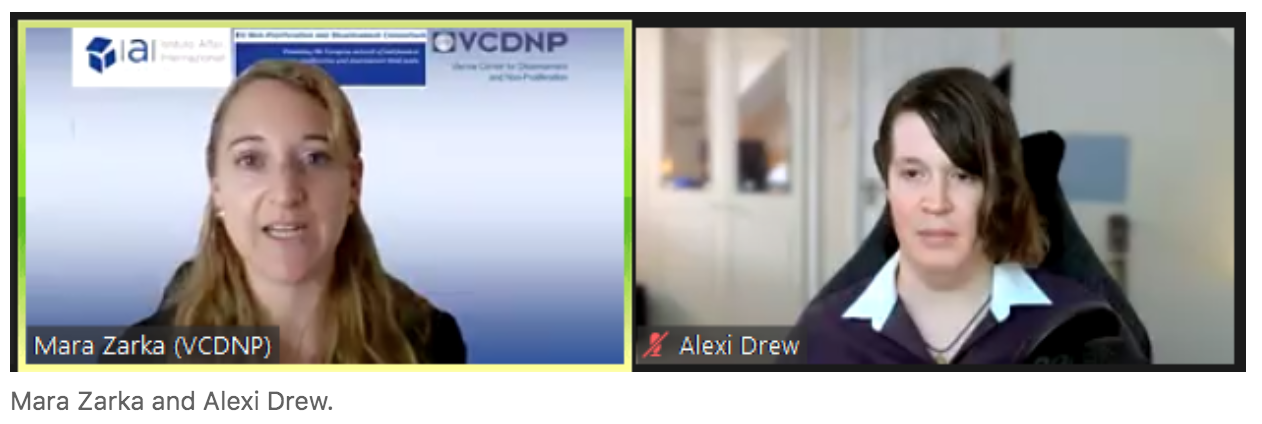 Another crucial and often underestimated aspect of cyber security has to do with supply chains that contribute to creating broader attack surfaces, linking private and public digital infrastructures. However, as Dr. Drew explained, not everything that takes place in the cyber space can or should be considered as a form of warfare. In the large majority of cases, it is about cyber espionage, never intended to cause physical damage. This difference is widespread and yet difficult to explain, since it is incidents such as the one that happened at the Natanz nuclear plant – actually intended to cause physical damage – that make the headlines. The consequent general failure in grasping these nuances between espionage and attacks remains one of the main barriers to effective policymaking on cybersecurity. The key of the instability risk that should be addressed by cybersecurity is indeed the possibility of escalation due to lack of knowledge, resulting from a deliberate policy on the side of both States and institutions involved in a cyber event. For instance, NATO members have never defined the standard beyond which a cyber incident can be considered a full-fledged attack, thus expanding the deterrent potential. However, this makes it hard to establish where the line is and represents a critical risk of escalation or “splash effect.” Dr. Drew concluded her remarks noting that cyber capabilities are rapidly proliferating, both in terms of defence and attack capabilities.
Another crucial and often underestimated aspect of cyber security has to do with supply chains that contribute to creating broader attack surfaces, linking private and public digital infrastructures. However, as Dr. Drew explained, not everything that takes place in the cyber space can or should be considered as a form of warfare. In the large majority of cases, it is about cyber espionage, never intended to cause physical damage. This difference is widespread and yet difficult to explain, since it is incidents such as the one that happened at the Natanz nuclear plant – actually intended to cause physical damage – that make the headlines. The consequent general failure in grasping these nuances between espionage and attacks remains one of the main barriers to effective policymaking on cybersecurity. The key of the instability risk that should be addressed by cybersecurity is indeed the possibility of escalation due to lack of knowledge, resulting from a deliberate policy on the side of both States and institutions involved in a cyber event. For instance, NATO members have never defined the standard beyond which a cyber incident can be considered a full-fledged attack, thus expanding the deterrent potential. However, this makes it hard to establish where the line is and represents a critical risk of escalation or “splash effect.” Dr. Drew concluded her remarks noting that cyber capabilities are rapidly proliferating, both in terms of defence and attack capabilities.
Networking session
During this session, participants were divided in groups and provided with ice-breaking questions. The discussion in the different groups covered both the main pressing challenges to non-proliferation and disarmament as well as ways in which the EUNPDC and its members could do to better engage the next generation and young women in the field.READ TAKEAWAYS FROM THE NETWORKING SESSION
The European Union’s Role in Non-Proliferation and Disarmament and Its Engagement with Academia and The Younger Generation
On 29 April 2021, as part of the Young Women and Next Generation Initiative (YWNGI), the VCDNP and the International Affairs Institute (IAI) in Rome, Italy, with the support of the […]
Find out more »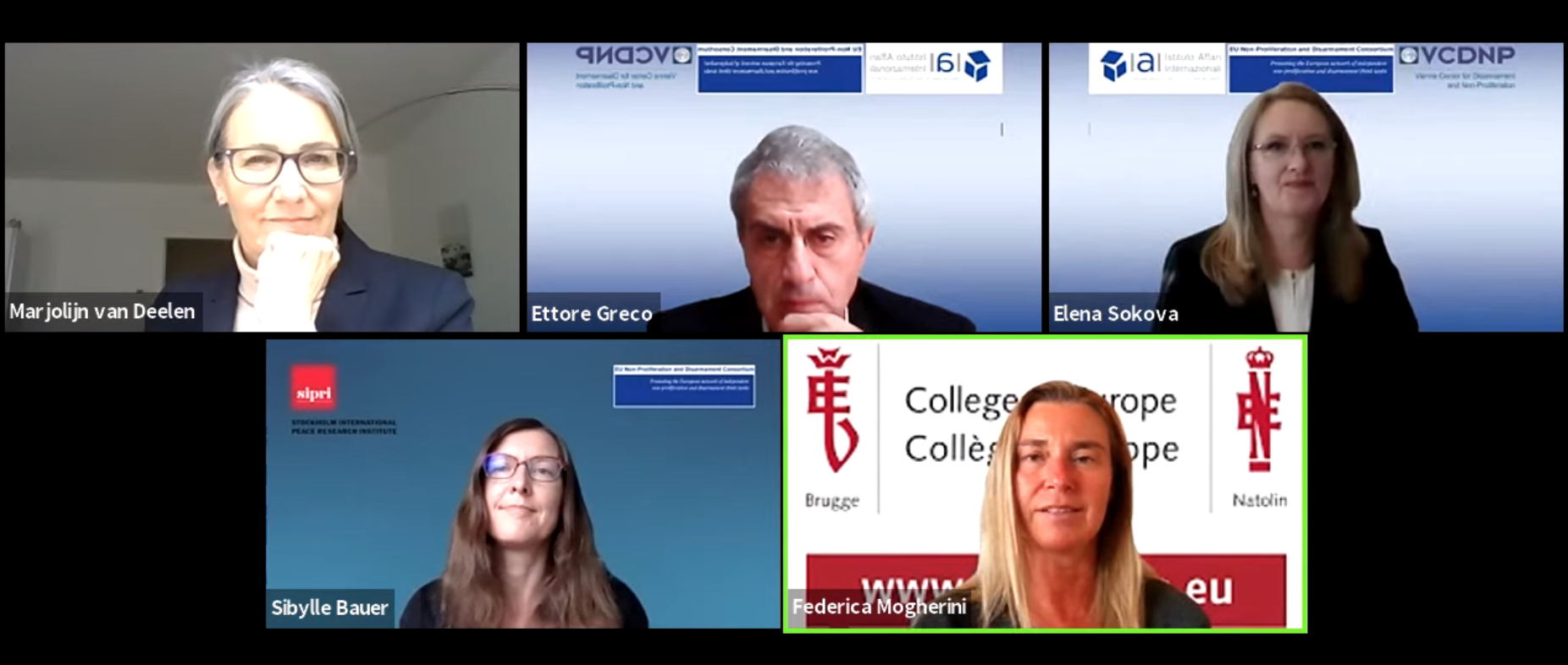 IAI’s Executive Vice President Ettore Greco provided welcome remarks and VCDNP’s Executive Director Elena Sokova moderated the session. Over 300 individuals attended the event, including many of the Young Women in Non‑Proliferation and Disarmament Mentorship Programme participants and other EUNPDC next generation conference and training course individuals. The high level of interest demonstrates the strong need for these discussions and opportunities to interact.
IAI’s Executive Vice President Ettore Greco provided welcome remarks and VCDNP’s Executive Director Elena Sokova moderated the session. Over 300 individuals attended the event, including many of the Young Women in Non‑Proliferation and Disarmament Mentorship Programme participants and other EUNPDC next generation conference and training course individuals. The high level of interest demonstrates the strong need for these discussions and opportunities to interact.
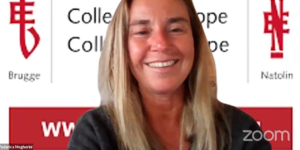
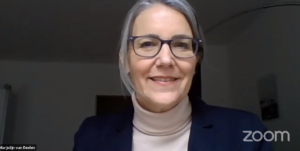
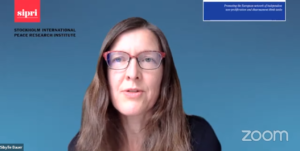
- Clear thinking and solid analysis;
- Excellence;
- Commitment;
- Authenticity;
- Integrity;
- Empathy, in which active listening and really caring was stressed; and
- Creative Problem Solving.
“What also is really important, I think, is to help others not just get a foot in the door but then to help them stay in the field and climb up.” – Sibylle BauerAdding to this list, other panellists emphasized the importance of working in teams, indicating that every role in a team is important and no one role should be perceived as any more or less significant.
“You need a mix of people that have different competences and when you put those together you can be much stronger.” – Marjolijn van DeelenThere was resounding agreement that passion and interest in what one is doing is the best guide to navigating one’s career. Also, the panellists encouraged participants to not be afraid to try new things and to be willing to go into depth on topics that may not fall within their educational background, whether it be more policy-oriented or technical.
“I think passion in what you are doing is the only thing that really counts.” – Federica MogheriniSome highlights from the question-and-answer session include insights into the difficulties in forming a common position in the EU, noting the diversity of the group and the need for fierce, internal debates. Once a common position or statement has been agreed, it serves as an umbrella under which other like-minded countries can align themselves. All speakers stressed that given the divergent views within the EU, when a common position has been adopted, especially on controversial matters, it is a powerful statement that can offer hope to the larger international community and refocus energy on where agreement exists, and action can be taken.
Do You Aspire to Work at an International Organization? Tips and Insights for Young Professionals.
The Vienna Center for Disarmament and Non-Proliferation (VCDNP) cordially invites you to attend a virtual event for young professionals and students interested in working at and engaging with international organisations […]
Find out more »